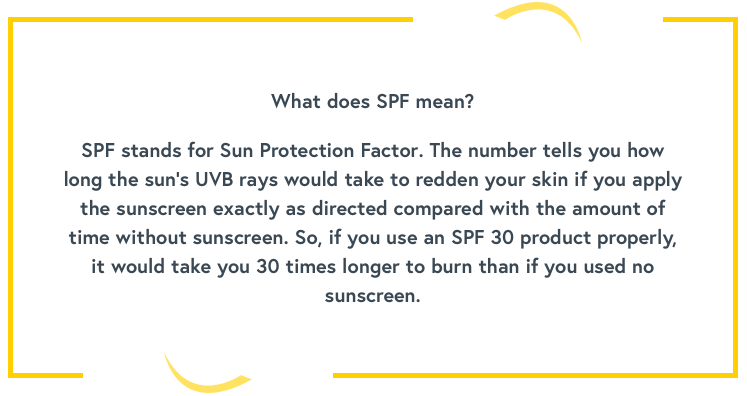Sunscreen is an essential part of an overall skin health and sun protection strategy. It’s been shown to decrease your risk of skin cancers and precancers; as well as help prevent premature skin aging.
Why is sunscreen important?
According to The Skin Cancer Foundation, one in five Americans will develop skin cancer by the age of 70. Plus, over time, sun exposure can lead to premature wrinkles, sagging, and age spots.
Sunscreens fall into two categories:
- Mineral sunscreens, which reflect and scatter the sun’s rays before they can penetrate your skin. They typically include the mineral ingredients titanium dioxide and zinc oxide.
- Chemical sunscreens, which absorb UV rays before they can damage your skin.
The 5 W’S (& 1 H) Of Sunscreen, from the Skin Cancer Foundation
WHO SHOULD WEAR IT: Everyone under the sun
The Skin Cancer Foundation recommends that everyone (except for babies under 6 months old) should use sunscreen on a regular basis, including those who tan easily. Even if you don’t get a sunburn, your skin can still be damaged. Damage from UV exposure is cumulative and increases your risk of developing skin cancer over time.
WHAT: Broad spectrum SPF 15 or higher; SPF 30 or higher if you’re outdoors
The best sunscreen to choose is the one you are most likely to use. Ensure that the kind you pick provides safe and effective protection!
WHEN: Every day!
The best practice is to apply sunscreen 30 minutes before you go outside, then reapply every two hours during sun exposure. Also, reapply after swimming or excessive sweating.
WHERE: All exposed skin
UVA can penetrate windows and cloud cover. This is why it’s important to make sunscreen a part of your daily skin care routine, even when it’s not sunny or you’re not planning to be outside much. Even when it’s cloudy, up to 80% of the sun’s UV radiation still reaches the earth.
HOW MUCH: Apply one ounce (shot glass full) to your entire body for each application
Most people apply less than half of the recommended amount, which reduces their level of sun protection.
WHY: Reduce your risk of skin damage and skin cancer!
Sunscreen reduces your overall UV exposure and lowers your risk of skin cancer and sun damage. Keep in mind that sunscreen alone is not enough for a complete sun protection strategy. You should also try to be in the shade whenever possible outside, and wear sun-safe clothing (i.e. a wide-brimmed hat and UV-blocking sunglasses).
What’s SPF?
From The Skin Cancer Foundation:

What type of sunscreen should you use?
It depends! Based on your skin type, family history, level of sensitivity, skin conditions, and preferences, certain types may work for you better than others.
Which is better for you – mineral or chemical sunscreens?
This depends on your personal preference. The FDA is currently re-evaluating a number of ingredients that commonly go into sunscreens. Two ingredients – zinc oxide and titanium dioxide, which are found in mineral sunscreens – have been confirmed “generally recognized as safe and effective” by the FDA. Twelve other active sunscreen ingredients – commonly found in chemical sunscreens – have “insufficient safety data” to currently make a public safety determination.
Generally, if you want to play it safe, mineral sunscreens are probably the way to go. However, some mineral sunscreens also contain chemical ingredients. Since sunscreen ingredients can be absorbed at a high rate through the skin, it’s important to carefully research the type you choose.
Best sunscreen for acne prone skin
If you break out a lot, you might benefit from sunscreen that is both oil-free and non-comedogenic. According to the AcneEinstein Medical Team, the best sunscreens for acne prone skin are sensitive, mineral-based formulas (i.e. physical sunblocks), such as Murad’s City Block.
Best sunscreen for dark skin tones
Certain sunscreens can leave behind an ashy residue on dark-toned skin. Instead, look for formulas that apply sheer, such as EltaMD UV.
Best sunscreen for daily use
Sunscreens that are non-greasy, fragrance free, and don’t irritate the skin are great for daily use. Something like EltaMD UV Clear Broad-Spectrum SPF 46 is an example, which is rich in antioxidants, has anti-inflammatory properties that can help prevent breakouts, and is oil free so it won’t clog pores.
Best sunscreen for sensitive skin
If you have sensitive skin, you may benefit from physical sunscreens instead of chemical ones. Try those that include zinc oxide and titanium dioxide, ingredients which are less likely to cause skin irritation in people who have sensitive skin.
Best sunscreen for babies
Infants younger than 6 months old should not wear sunscreen, as their skin is highly sensitive. Instead, they should be largely kept out of direct sunlight, in the shade when outside, and in protective clothing when necessary.
Best sunscreen for swimmers
While no sunscreen is waterproof, there are some that are highly water resistant. Some stay on for up to 40 or 80 minutes of swimming (for ex. Hawaiian Tropic’s
***
The Skin Cancer Foundation recommends that you examine your skin head-to-toe every month. Read our article on how to perform your own skin exam at home!
*****
To partner with your own personal doctor online, get matched with a doctor today by taking the SteadyMD quiz. Get a doctor who fits into your lifestyle and schedule, not the other way around.
